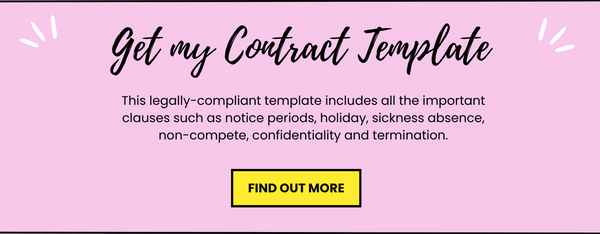How to hire temporary staff with more ease

If you are a small business owner, then you'll know that hiring a permanent employee may not always fit the bill. This is especially true in a retail or hospitality business where there's peaks and troughs and therefore it's essential that you build a flexible workforce to survive and thrive.
For example, you might run a business that’s busy at Christmas? 🎄Or, perhaps your business relies on holidaymakers in the summer months? Knowing this enables you to plan your resource more effectively and forecast when you need in advance. 🌞
Equally, temporary staff are needed when you have an unplanned pickle 😱 For example, when an employee goes off sick or you need someone to cover maternity leave!
In this situation you have some options in terms of types of employment you bring in.
In this blog, I’ll summarise each of the ways you can hire temporary staff without the stress.
5 Types of Hires you can make without commitments
There's lots of options available when it comes to hiring temporary staff. Here's the five key types of hire you can make, along with when these may be most beneficial.
#1. Agency staff 👇
You pay an agency to supply you with a staff member, as and when you need them.
The worker gets paid by the recruitment agency – although their wages, National Insurance contributions (NICs), and Statutory Sick Pay (SSP) – is of course, all funded by you. You’ll also pay the agency a fee for their hiring services.
This can be expensive, so this option is best when you just need someone for a week or two.
Contract Type = You and the Agency have agreed terms
#2. Fixed-term employees 👇
Fixed-term staff are temporary employees on fixed-term contracts e.g. 6 months. As you can imagine, this type of arrangement is best for 3 months plus, such as to cover things like maternity leave.
Somebody on a fixed-term contract is an employee with full rights and holiday entitlement. They cannot be treated any less favourably than somebody who does a similar job for you, on a different type of contract. Unless it’s for a sensible business reason. And, if they’ve been with you for longer than two years – and you choose NOT to renew their contract – you must have a ‘fair’ reason why.
Contract Type = Fixed-Term Employment Contract
#3. Self-employed contractors 👇
Self-employed contractors – or freelancers as they’re often called – charge you for a service they provide you with. They are best when you want an injection of expertise without any commitments. They would usually have an hourly fee and invoice you for the work they’ve done for you.
Contract Type = Contract for Services
#4. Zero hour casual staff 👇
As the name suggests, zero-hours staff have no set hours and are simply paid for the hours they complete. They are often employees or workers (in the eyes of the law) and they will accrue holiday pay and are entitled to the national minimum wage.
You don’t have to guarantee work, and they have the right to refuse work if they are not available.
Zero hour contracts have a bad name, because they have been abused by global corporations who can easily afford to pay staff a consistent wage, but in small businesses they can work brilliantly for employers and staff members.
Contract Type = Zero Hours Contract
#5. Volunteers👇
If you're a Charity or Not-for-profit business, you may be lucky enough to entice unpaid volunteers to help you out. This can be for a fixed period and reviewed to ensure it's working for both parties.
Contract Type = Volunteer Agreement
All hires need a Contract
No matter what type of resource you hire – be it an employee, a casual worker, or a contractor – you still need to provide them with a contract.
This is even more important when staff are transient and you have less control of what they do for you and the hours they work for you.
Contracts protect you from any nasty misunderstandings that could rear their ugly head. 👹







